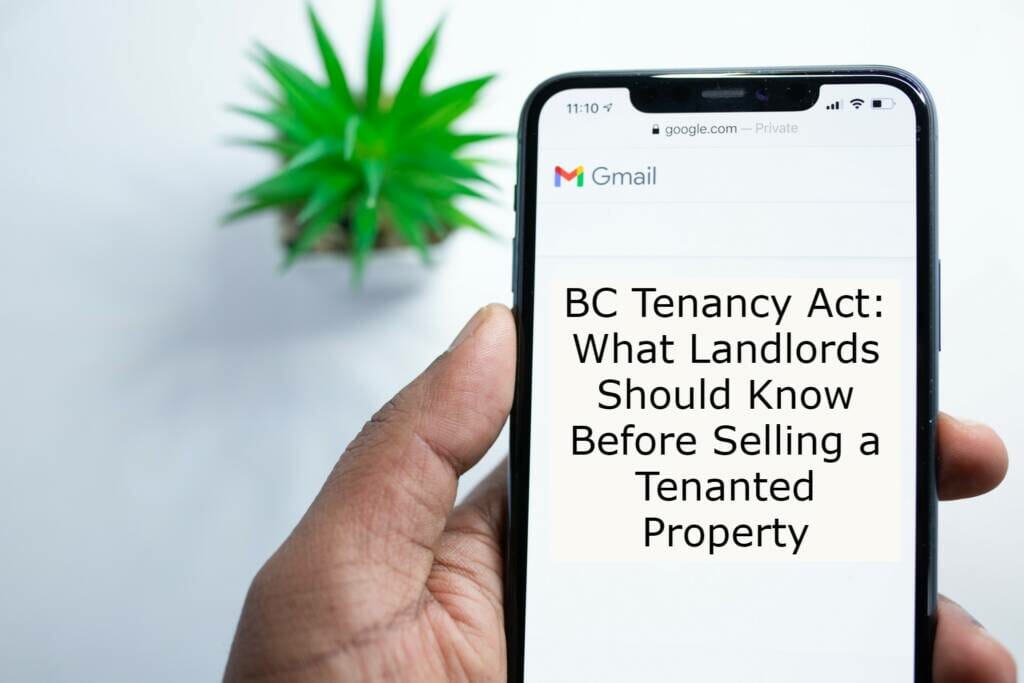
BC Tenancy Act: Tenant and Landlord rights
You’ve decided to sell your property! But… you have a tenant. This can be a stressful time for both the landlord and tenant.
So what are the Do’s and Don’t of maintaining a good relationship with your Tenant during this process? Let’s look at the Province of BC’s Residential Tenancy Act.
In our previous article “BC Tenancy Act: What Realtors Should Know Before Selling a Tenanted Property” we looked at the Do’s and Don’ts of maintaining a good relationship with the tenant during this process.
sHOWING A PROPERTY
The tenant has a legal right to peace and quiet while the tenancy continues. The landlord or their agent must provide written notice to the tenant or have their permission to enter and show the unit to prospective buyers or to conduct an open house.
The notice must provide the:
- Reason for entering the rental unit
- Date and time of entry – which must be between 8 a.m. and 9 p.m., unless the tenant agrees to another time
- Ideally, a tenant and landlord can agree in writing on a schedule for viewing times. If not, the landlord must give the tenant 24 hours written notice of each showing of the unit (these showings may be on the same day or on a reasonable number of other days).
When the landlord has given proper notice, they can show the rental unit even if the tenant isn’t home.
During showings of the rental unit, the landlord or the landlord’s agent is required to ensure the safety of the tenant’s possessions.
OPEN HOUSES
A standard showing of a rental unit requires the landlord or the landlord’s agent (Ex. a Realtor) to accompany any prospective purchaser. With open houses, multiple prospective purchasers or agents may attend the property at the same time with varying levels of direct supervision by the landlord’s agent. Landlords should be aware of the tenants’ right to quiet enjoyment and avoid holding multiple open houses in a short period of time as these have the potential to be disruptive.
TENANT RIGHTS AND RESPONSIBILITIES
When the landlord has given proper notice to enter the rental unit, the tenant must not prevent the landlord’s access (or access by the landlord’s agent).
The tenant, or a representative of the tenant, may be present at the time the rental unit is entered. The landlord cannot require that a tenant leave when the rental unit is shown. Tenants who are concerned about their possessions may be present.
When a rental unit is being shown to prospective buyers or prospective tenants, the landlord or the landlord’s agent must be present.
Can a tenant refuse entry that’s unreasonable or unlawful?
Unreasonable entry could be all-day showings every Saturday for several weeks. Unlawful entry could be where the landlord or the landlord’s agent has not provided proper notice of entry.
Uncooperative Tenants
If a tenant unreasonably refuses access to show the unit or provides misleading or inaccurate information to prospective buyers, the landlord could:
- Discuss the situation with the tenant
- Invite them to contact the Residential Tenancy Branch
- Serve a One Month Notice to End Tenancy for Cause
It’s SOLD! Now what?
Once a property is sold, the buyer becomes the new landlord and the tenancy continues under the same terms. The buyer and the tenants don’t need to sign a new tenancy agreement, but may do so if they both agree.
The buyer must serve notice to end the tenancy in good faith if they plan to occupy the unit or use it for other purposes – the tenant has 15 days to dispute that notice
How to give legal notice
Sudden tenancy eviction notices can happen but in BC you can’t just randomly evict a tenant, you have to serve proper legal notice.
EXAMPLE: if rent is due on the 1st of every month and you receive a firm deal on March 15:
- You would give notice prior to September 1st.
- If the tenant as acknowledges it received by August 31st then the two months notice is now effective September 1st.
- The entirety of September & October would constitute as two months notice.
- The buyer could move in as of November 1st.
**Keep in mind any holidays when serving notice**
What if the buyer is doing demolition, renovation, repairs or a conversion?
“Renoviction” is a term used in British Columbia to describe an eviction that is carried out to renovate or repair a rental unit.
Effective July 1, 2021, under new legislation, if a landlord wants to end a tenancy for extensive renovations or repairs, they need to apply for an Order of Possession from the Residential Tenancy Branch.
- Four months notice is required
- Learn more about the new legislation
Compensation
When serving a Two Month Notice to End Tenancy or a Four Month Notice to End Tenancy, the landlord must compensate the tenant with an amount equal to one month’s rent – paid on or before the effective date of the notice period. Compensation is owed even if the tenant gives notice to leave earlier. The tenant may choose to not pay rent in the last month of the tenancy instead of taking a payment from the landlord.
- Learn about rights and responsibilities in this situation
- Find out about additional compensation
Security and Pet Damage Deposits
When a tenant moves out, the person who owns the property at the time is responsible for the tenant’s security deposit or pet deposit. This may make the buyer responsible for a tenant’s security deposit or pet damage deposit, even though the deposits were held in trust by the seller. The buyer and seller may wish to address the transfer of deposits in trust in their contract of sale or the closing settlement.
If the tenant owes money to the seller, it’s important that the parties to the sale – the buyer and seller – address these debts clearly in the contract of sale and purchase. Landlords should seek independent legal advice if they’re unsure how to do this.
Landlord’s Use of Property
There are two ways a tenancy can be ended if, in good faith, the buyer plans to occupy the unit or use the property for another purpose:
- The buyer submits a written request to the seller to end the tenancy before taking possession of the property (service of notice cannot be a condition of sale). Then the seller (or existing landlord) gives the tenant a Two Month Notice to End Tenancy for Landlord’s Use of Property
- Once the buyer takes possession of the property, they can serve a Two Month Notice to End Tenancy for Landlord’s Use of Property
Occupy the unit
Once they take possession, a buyer can choose to live in the unit themselves, or have a close family member live there. That would mean the father, mother or child of the landlord or the landlord’s spouse – it doesn’t include the brother or sister of the landlord or the brother or sister of the landlord’s spouse. If a family corporation owns the rental unit, then a close family member would also include an individual who owns, or whose close family member owns, all the voting shares.
LINKS:
BC RTO – Selling a Tenanted Property
BC Tenancy Forms – All tenancy forms
